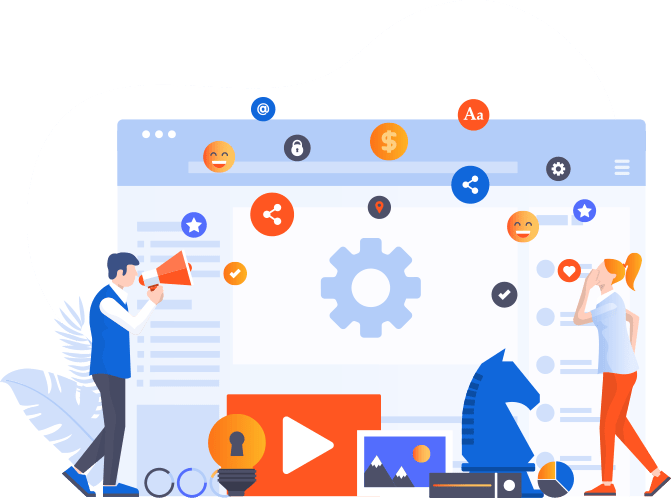WANT TO START
- Home
- WANT TO START
how to get started
A Few Simple Steps
for a Successful Partnership
01

Discovery & Consultation
We begin by understanding your business goals, target audience, and current challenges. This helps us create a digital marketing strategy tailored just for you.
02

Strategy & Planning
Our team develops a clear action plan—covering SEO, social media, content, and paid campaigns—to maximize your visibility and growth online.
03

Execution & Growth
We bring the strategy to life, monitor performance, and continuously optimize to ensure long-term results and measurable success for your brand.
What is Content Marketing?
Content marketing is a strategic marketing approach that focuses on creating and sharing valuable, relevant, and consistent content to attract and engage a clearly defined audience — with the ultimate goal of driving profitable customer action.
Instead of directly promoting a product or service, content marketing provides information, education, or entertainment that builds trust and authority with potential customers.
Examples of Content Marketing:
Blog articles that answer customer questions.
Videos/Reels that explain or showcase solutions.
Social media posts that build community and brand awareness.
Guides, eBooks, or case studies that provide in-depth value.
Email newsletters that keep your audience engaged.
.

What is Influencer marketing ?
Influencer marketing is a type of marketing that leverages the credibility, reach, and trust of influencers — individuals who have built an engaged audience on social media or other platforms — to promote products, services, or brands.
Instead of a brand speaking directly to consumers, the influencer acts as a bridge by sharing authentic recommendations and experiences with their community.
Key Benefits of Influencer Marketing:
Trust & Authenticity → People trust influencers they follow.
Targeted Reach → Influencers connect with niche or large audiences.
High Engagement → Campaigns often perform better than traditional ads.
👉 In short: Influencer marketing = partnering with trusted voices to reach and engage your ideal audience.
.

Social Media Marketing (SMM) ?
Social Media Marketing (SMM) is the use of social platforms like Facebook, Instagram, TikTok, LinkedIn, Twitter/X, and YouTube to promote your business, build brand awareness, connect with your audience, and drive sales.
Instead of just posting, social media marketing uses strategies, paid ads, and engaging content to grow a business’s online presence.
Key Components of Social Media Marketing:
Content Creation → Posts, Reels, Stories, and videos that capture attention.
Community Management → Engaging with followers, answering messages, and building trust.
Paid Advertising → Running targeted ad campaigns to reach potential customers.
Analytics & Optimization → Tracking performance, learning what works, and scaling results.
👉 In short: Social Media Marketing helps businesses grow by turning followers into customers and customers into loyal fans.

What is SEO Optimization?
Search Engine Optimization (SEO) is the process of improving a website so it ranks higher in search engines like Google, Bing, or Yahoo. The goal is to increase visibility, attract organic traffic, and reach potential customers without paying for ads.
Key Elements of SEO:
On-Page SEO → Optimizing website content (titles, keywords, meta descriptions, headings, images).
Technical SEO → Ensuring site speed, mobile-friendliness, crawlability, and secure connections (HTTPS).
Off-Page SEO → Building credibility through backlinks, social signals, and online authority.
Content Strategy → Creating valuable, relevant content that answers users’ questions.
👉 In short: SEO helps your business appear where people are already searching — at the top of search results.

What is Web Development?
Web development is the process of designing, building, and maintaining websites that are functional, fast, and user-friendly. A well-built website is the foundation of any digital presence — it’s where customers learn about your business, interact with your brand, and often make their first purchase or inquiry.
What Web Development Includes:
Custom Website Design → Tailored to your brand identity and business needs.
Responsive Development → Optimized for desktop, tablet, and mobile.
E-Commerce Solutions → Online stores with secure payments and inventory management.
CMS Integration → Easy-to-manage platforms (WordPress, Shopify, etc.).
Performance & Security → Fast loading times, SEO-friendly structure, and safe browsing.
👉 In short: Your website is your digital storefront — we make it modern, secure, and built to convert visitors into clients.
The keywords typed into a search box reveal certain details about customers and how they go about searching for things. Knowing this, it’s important to target keywords that mimic your customer’s minds and search tendencies.

What is PCC Advertising?
PPC Management (Pay-Per-Click Management) is the process of planning, creating, and optimizing paid advertising campaigns on platforms like Google Ads, Facebook Ads, Instagram Ads, LinkedIn, and TikTok. Businesses pay only when someone clicks on their ad, making it a highly targeted and cost-effective strategy.
What PPC Management Includes:
Keyword Research & Targeting → Finding the best search terms or audience interests for your ads.
Ad Creation → Writing compelling ad copy and designing visuals or videos that attract clicks.
Campaign Setup → Choosing platforms, ad formats, targeting options, and budget allocation.
Ongoing Optimization → Monitoring performance, adjusting bids, testing variations (A/B testing), and improving ROI.
Reporting & Analysis → Tracking conversions, cost-per-click (CPC), and return on ad spend (ROAS).
👉 In short: PPC Management ensures your ads reach the right people, at the right time, with the right message — while maximizing your advertising budget.


